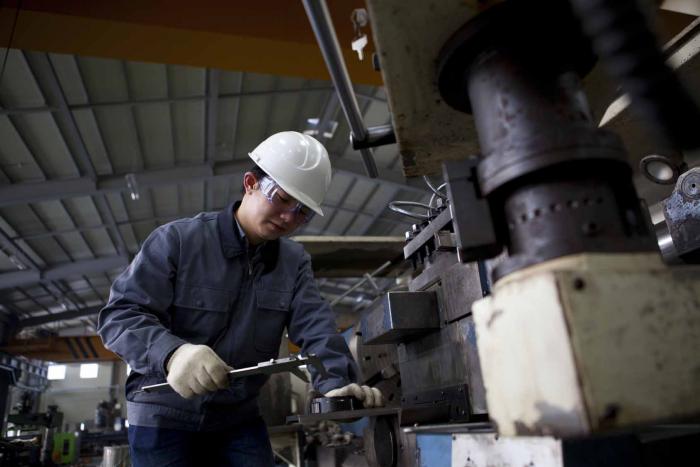
About
Ask yourself...
- Are you good at solving problems?
- Could you read blueprints and visualize a layout?
- Do you like working with heavy-duty equipment and machines?
- Do you like precise work?
- Are you looking for on-the-job variety?
If yes, then Construction Millwright/Industrial Mechanic could be the career for you.
Construction millwrights and industrial mechanics install, maintain, troubleshoot and repair stationary industrial machinery and mechanical equipment.
They are employed by manufacturing and construction companies, as well as amusement parks and ski hills.
Duties
As a Construction Millwright/Industrial Mechanic, your duties may include the following:
- Inspecting, repairing, cleaning and maintaining industrial machinery and equipment
- Operating cranes and tractors to move machinery
- Operating lathes or grinders to build parts for maintenance of machinery and equipment
- Reading and interpreting blueprints and schematic drawings
Work Conditions
The standard work week for construction millwrights and industrial mechanics is 40 hours (8 hours a day, 5 days a week). As with many careers in construction, there are peak periods that will require you to work overtime. The number of additional hours you work each week depends on the construction sector and region you work in, and will vary from one job to the next. If you do maintenance work, you may work in shifts.
As a Construction Millwright/Industrial Mechanic, you may work indoors or outdoors, often closely with other construction professionals, including electricians, steamfitter/pipefitters or welders. The job can be physically demanding – you may have to work with heavy equipment and materials.
As with all careers in the construction industry, safety is the top priority. Construction millwrights and industrial mechanics are trained to work safely and wear special equipment to protect against injury.
Training and Certification
Apprenticeship
Apprenticeship involves both classroom studies and on-the-job training under the supervision of a certified Construction Millwright/Industrial Mechanic, called a journeyperson.
As an apprentice, you earn while you learn and are paid by the hour while working on the job site. Wages start at about 60 per cent of a journeyperson’s hourly rate and increase during your apprenticeship until you reach the full rate.
Entering an apprenticeship program
Requirements for construction millwright/industrial mechanic apprenticeship programs vary across Canada. In most provinces and territories, you must be at least 16 years old and have a Grade 12 education or equivalent to enter the apprenticeship program. You must also have courses in math, science and English.
Some provinces and territories offer secondary school apprenticeship programs that allow high school students to work towards a career as a Construction Millwright/Industrial Mechanic.
For more information, check out the apprenticeship section.
Program length
Apprenticeship training programs for construction millwrights/industrial mechanics vary across Canada, but generally involve four 12-month periods, including at least 6,240 hours of on-the-job training, four eight-week blocks of technical training and a final certificate exam.
Related work experience or completion of a construction millwright/industrial mechanic program at a college or technical institute can reduce the time required to complete your apprenticeship.
Certification
Certification is not required. It is available but voluntary in Ontario. Where certification is not available, it may be possible to study as an apprentice through your local labour organization. Check out Related links to find out who to contact. Even where certification is voluntary, it is still recommended. Certification tells employers and other workers that you are a skilled professional. It also helps you get jobs.
To be certified as a Construction Millwright/Industrial Mechanic, you usually need to complete a four-year apprenticeship program. Once you successfully complete the required on-the-job training, technical training and exams, you are awarded a journeyperson certificate.
You may be eligible for certification in some provinces and territories if you have more than five years of on-the-job experience and some high school, college or industry courses for construction millwrights/industrial mechanics.
As a certified Construction Millwright/Industrial Mechanic, you may attempt the Interprovincial Exam to qualify for the Interprovincial Standards’ Red Seal. With a Red Seal, you can work as a Construction Millwright/Industrial Mechanic anywhere in Canada.
To keep your skills current, you have to keep up with new technological developments by reading and talking with other construction millwrights and industrial mechanics.
Courses
Anticipated In-Demand Regions
- New Brunswick
- Ontario - Eastern Region
- Ontario - Greater Toronto Area (GTA)
- Ontario - Northern Region
- Ontario - Southwest Region
Wage
 | ||
| Échelle médiane $64 480 |  | Plus élevé $92 770 |
L’« échelle médiane » est basée sur le salaire « médian » national indiqué sur le site Guichet-Emplois pour le profil de carrière associé au code de Classification nationale des professions (CNP) : 7311
Remarque : Certains profils de carrières peuvent être associés à plus d’un code CNP.








